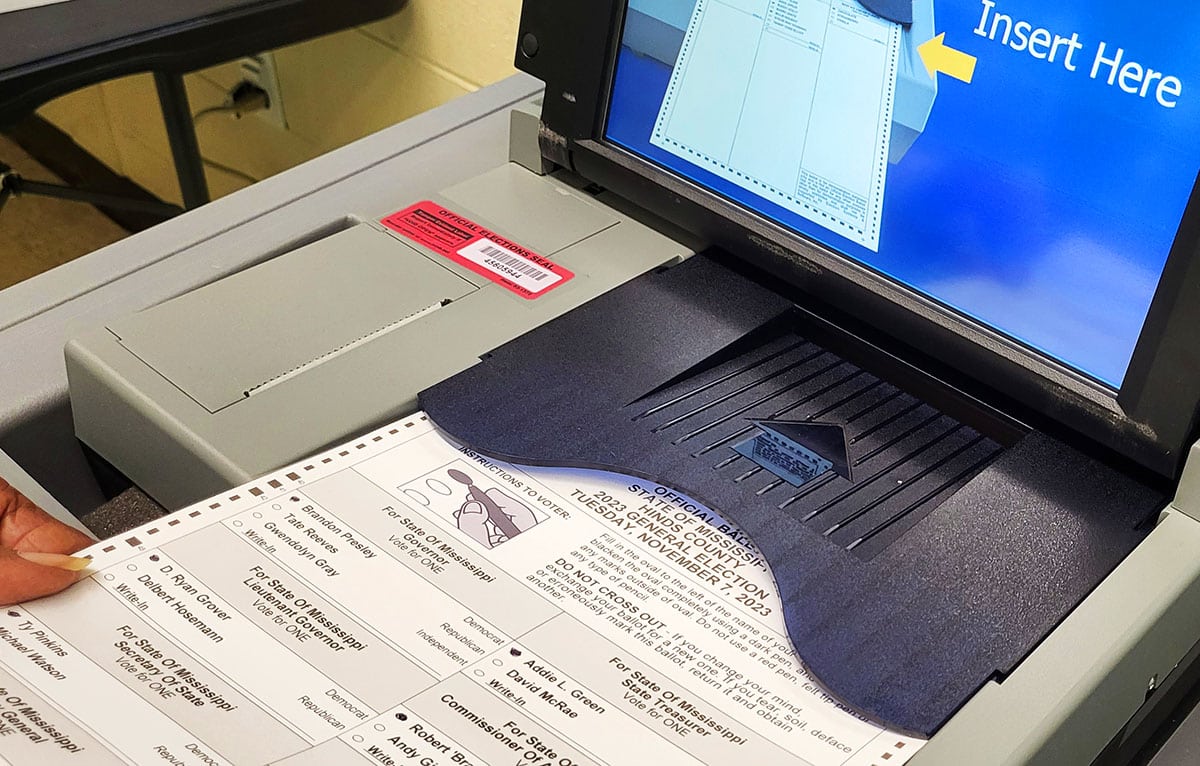Mississippi Today
New organization pushes Legislature to restore ballot initiative

Leaders of a recently formed organization hope they can finally convince a new slate of state lawmakers to restore a process for Mississippians to bypass politicians at the Capitol and place initiatives on a statewide ballot for consideration.
A bipartisan group of political and business leaders from across the state created Ballot Access Mississippi, or BAM, to provide an outlet for voters to advocate the state Legislature to reinstate the initiative.
“It’s one of those things that everybody is for, but it’s not the main focus of anyone right now,” said Spence Flatgard, the chairman of the organization. “We saw BAM as a way to be helpful.”
The Mississippi Constitution explicitly gives citizens the right to place measures on a statewide ballot for consideration. But the Mississippi Supreme Court in 2021 struck down the state’s initiative process because of a technicality over the number of the state’s congressional districts.
The leaders of the Capitol’s two legislative chambers recently told the reporters they support legislation to restore the initiative.
House Speaker Jason White, R-West, told reporters last week that the House will likely vote on legislation early in the session to restore the initiative process.
“It will probably have a slightly higher signature threshold than what we had before the Supreme Court ruled,” White said. “It will probably also include that those initiatives go into statute and not in the Constitution.”
Similarly, Leah Smith, a spokesperson for Republican Lt. Gov. Delbert Hosemann, said in a statement that Senate leaders anticipate they will debate the initiative process with “more discussion around signature and other requirements.”
“The Lt. Governor has consistently said he supports an initiative process,” Smith said.
The House and Senate, for the last two legislative sessions, failed to reach an agreement over how to restore the initiative process, with the main disagreement between the two chambers centering on how many signatures petitioners should be required to gather.
The prior process required organizers to gather around 106,190 signatures before the initiative could be placed on a ballot. After the court struck down the process, the House wanted a signature requirement similar to the old process, while the Senate wanted a higher requirement.
This year, Flatgard thinks BAM can break through a potential impasse by advocating for the initiative earlier in the session and having the organization’s board members work directly with key legislative leaders.
“We’re trying to tee it up early, and once it is teed up, we have people on the board who know House and Senate leaders and can help facilitate a resolution that restores the right at the end,” Flatgard said.
During the 30 years that the state had an initiative, only seven proposals made it to a statewide ballot: two initiatives for term limits, eminent domain, voter ID, a personhood amendment, medical marijuana and a measure forcing lawmakers to fund public education fully.
Of those seven, only eminent domain, voter ID and medical marijuana were approved by voters. The rest were rejected.
This article first appeared on Mississippi Today and is republished here under a Creative Commons license.
Did you miss our previous article…
https://www.biloxinewsevents.com/?p=321496
Mississippi Today
Mississippians honor first Black lawmaker since Reconstruction
Mississippians honor first Black lawmaker since Reconstruction

Former Mississippi Rep. Robert Clark Jr. lay in state Sunday in the Capitol Rotunda as family, friends, officials and fellow citizens paid respect to the first Black legislator in the state since Reconstruction.
Clark, a Holmes County native, was elected to the House in 1967 and served until his retirement in 2004. He was elected speaker pro tempore by the House membership in 1993 and held that second-highest House position until his retirement.
The Senate and House honored the 96-year-old veteran lamaker last week.

“Robert Clark … broke so many barriers in the state of Mississippi with class, resolve and intellect. So he is going to be sorely missed,” Lt. Gov. Delbert Hosemann said last week.
Hosemann was among those who came Sunday to honor Clark. So did House Speaker Jason White, who like Clark hails from Holmes County.

Clark was the only Black Mississippian serving in the Legislature from until 1976 and was ostracized when first elected, sitting at a desk by himself for years without the traditional deskmates. But he rose to become a respected leader.
An educator when elected to the House, Clark served 10 years as chair of the House Education Committee, including when the historic Education Reform Act of 1982 was passed.
Clark served as the only Black Mississippian serving in the Legislature from 1968 until 1976.
“He was a trailblazer and icon for sure,” White said last week.




This article first appeared on Mississippi Today and is republished here under a Creative Commons license.![]()
Mississippi Today
On this day in 1912

March 9, 1912

Charlotta Bass became one of the nation’s first Black female editor-owners. She renamed The California Owl newspaper The California Eagle, and turned it into a hard-hitting publication. She campaigned against the racist film “Birth of a Nation,” which depicted the Ku Klux Klan as heroes, and against the mistreatment of African Americans in World War I.
After the war ended, she fought racism and segregation in Los Angeles, getting companies to end discriminatory practices. She also denounced political brutality, running front-page stories that read, “Trigger-Happy Cop Freed After Slaying Youth.”
When she reported on a KKK plot against Black leaders, eight Klansmen showed up at her offices. She pulled a pistol out of her desk, and they beat a “hasty retreat,”
The New York Times reported. “Mrs. Bass,” her husband told her, “one of these days you are going to get me killed.” She replied, “Mr. Bass, it will be in a good cause.”
In the 1940s, she began her first foray into politics, running for the Los Angeles City Council. In 1951, she sold the Eagle and co-founded Sojourners for Truth and Justice, a Black women’s group. A year later, she became the first Black woman to run for vice president, running on the Progressive Party ticket. Her campaign slogan: “Win or Lose, We Win by Raising the Issues.”
When Kamala Harris became the first Black female vice presidential candidate for a major political party in 2020, Bass’ pioneering steps were recalled.
“Bass would not win,” The Times wrote. “But she would make history, and for a brief time her lifelong fight for equality would enter the national spotlight.”
This article first appeared on Mississippi Today and is republished here under a Creative Commons license.![]()
Mississippi Today
On this day in 1977
On this day in 1977
March 8, 1977

Henry L. Marsh III became the first Black mayor of the former capital of the Confederacy, Richmond, Virginia.
Growing up in Virginia, he attended a one-room school that had seven grades and one teacher. Afterward, he went to Richmond, where he became vice president of the senior class at Maggie L. Walker High School and president of the student NAACP branch.
When Virginia lawmakers debated whether to adopt “massive resistance,” he testified against that plan and later won a scholarship for Howard University School of Law. He decided to become a lawyer to “help make positive change happen.” After graduating, he helped win thousands of workers their class-actions cases and helped others succeed in fighting segregation cases.
“We were constantly fighting against race prejudice,” he recalled. “For instance, in the case of Franklin v. Giles County, a local official fired all of the black public school teachers. We sued and got the (that) decision overruled.”
In 1966, he was elected to the Richmond City Council and later became the city’s first Black mayor for five years. He inherited a landlocked city that had lost 40% of its retail revenues in three years, comparing it to “taking a wounded man, tying his hands behind his back, planting his feet in concrete and throwing him in the water and saying, ‘OK, let’s see you survive.’”
In the end, he led the city from “acute racial polarization towards a more civil society.” He served as president of the National Black Caucus of Elected Officials and as a member of the board of directors of the National League of Cities.
As an education supporter, he formed the Support Committee for Excellence in the Public Schools. He also hosts the city’s Annual Juneteenth Celebration. The courthouse where he practiced now bears his name and so does an elementary school.
Marsh also worked to bridge the city’s racial divide, creating what is now known as Venture Richmond. He was often quoted as saying, “It doesn’t impress me to say that something has never been done before, because everything that is done for the first time had never been done before.”
He died on Jan. 23, 2025, at the age of 91.
This article first appeared on Mississippi Today and is republished here under a Creative Commons license.![]()
-

 News from the South - Louisiana News Feed4 days ago
News from the South - Louisiana News Feed4 days agoRemarkable Woman 2024: What Dawn Bradley-Fletcher has been up to over the year
-

 News from the South - Oklahoma News Feed2 days ago
News from the South - Oklahoma News Feed2 days agoFeed the Children rolls out new program to help Oklahoma families
-

 News from the South - Oklahoma News Feed3 days ago
News from the South - Oklahoma News Feed3 days agoMarch 6,2025: Rain and snow on the way
-

 News from the South - Virginia News Feed7 days ago
News from the South - Virginia News Feed7 days agoProbation ends in termination for Va. FEMA worker caught in mass layoffs
-

 News from the South - Texas News Feed4 days ago
News from the South - Texas News Feed4 days agoTravis County DA failed to meet deadline to indict murder suspect | FOX 7 Austin
-

 News from the South - North Carolina News Feed6 days ago
News from the South - North Carolina News Feed6 days agoConfederate monument in Edenton will remain in place for now
-

 Mississippi Today5 days ago
Mississippi Today5 days agoKey lawmaker reverses course, passes bill to give poor women earlier prenatal care
-

 News from the South - Oklahoma News Feed7 days ago
News from the South - Oklahoma News Feed7 days agoTimeline: Storms bring a risk of tornadoes, damaging winds to Oklahoma (March 3, 2025)
















































